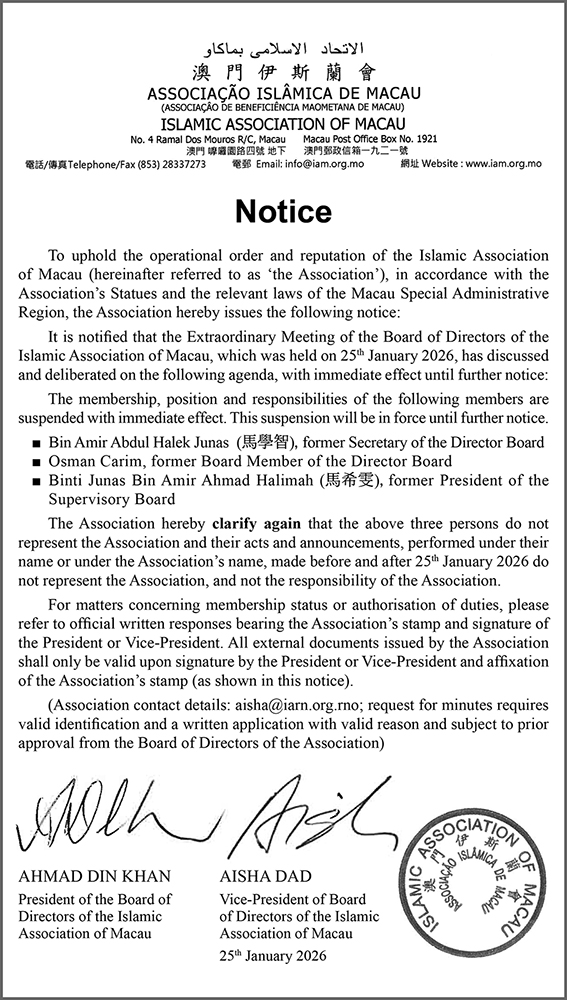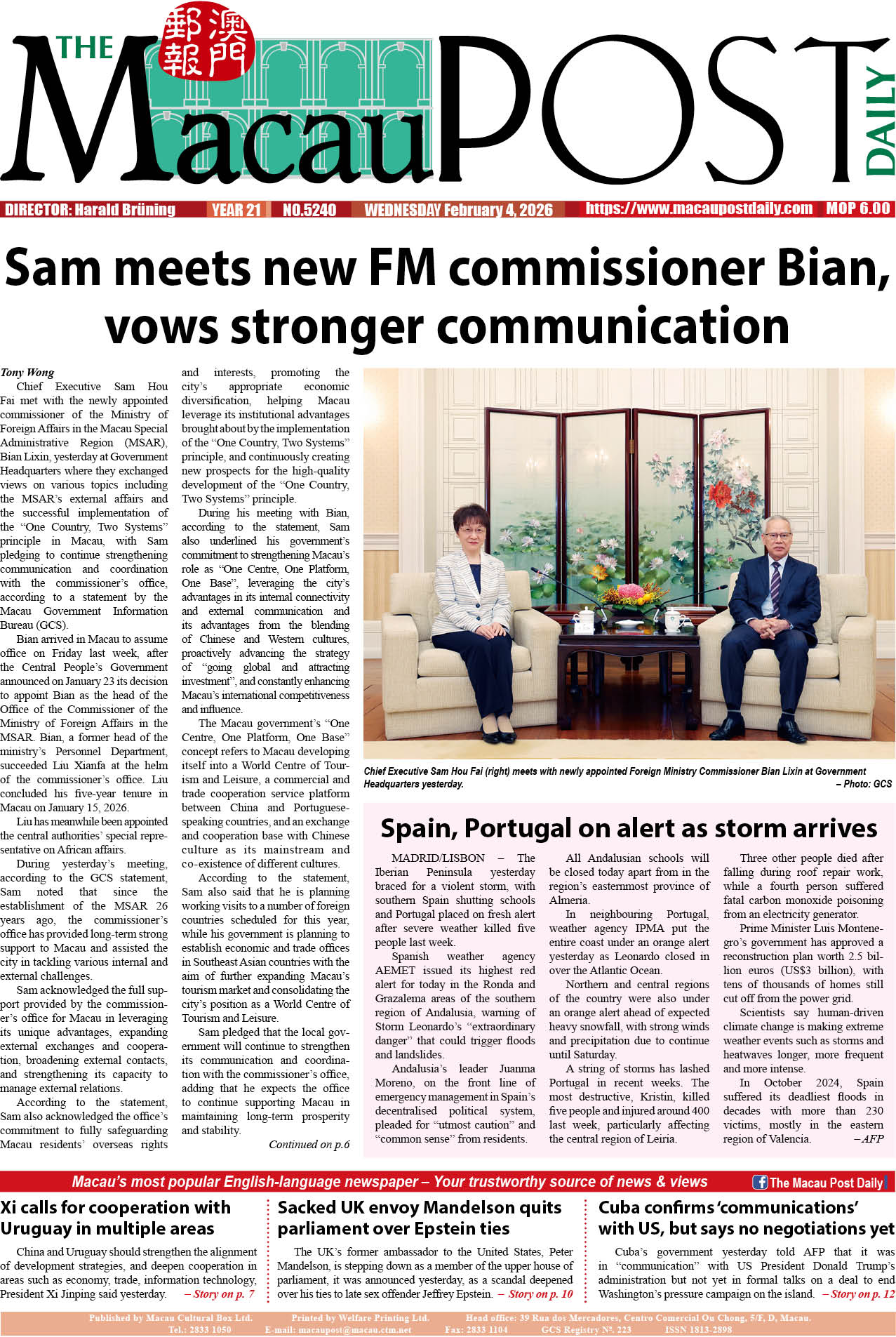Editorial
Yesterday was an extraordinarily happy day for many in the mainland, Hong Kong and Macau as for the first time in nearly three years the three Chinese regions opened their borders to basically unrestricted travel among them.
When I was watching the Cantonese-language channels of TDM and TVB yesterday morning travellers’ joy was clearly visible, and two of the most frequently uttered words by border crossers talking to reporters were “hoisam” (“happy”) and “hingfan” (“excited”).
Of course, yesterday was also a day of profound sadness for all those mourning their loved ones who died from or with COVID-19 in the past few weeks.
Dying “from” or “with” COVID-19 are different things. It is often hard for doctors to determine which of these categories a fatality falls into. That’s why COVID-19 death tolls are many times rather controversial – everywhere. To a certain extent, it’s a matter of opinion.
I am one of the government-estimated 70 percent of the local population who have contracted COVID-19 since the local government began its “transition” about a month ago towards scrapping most of the city’s COVID-19 control measures. Chief Executive Ho Iat Seng was honest and right when he predicted last month that the “transition” would be “tough and difficult.”
President Xi Jinping said in his New Year address that “we have now entered a new phase of COVID response where tough challenges remain. Everyone is holding on with great fortitude and the light of hope is right in front of us. Let’s make an extra effort to pull through, as perseverance and solidarity mean victory.”
I agree that without perseverance and solidarity victory over the novel coronavirus cannot be achieved. Solidarity is the commitment to the unnegatable fact that we are all in this together. Solidarity without perseverance lacks effectiveness.
I spent a week in self-isolation at home over Christmas, suffering from an extremely painful sore throat and nasal congestion but only a light fever and neither a headache nor cough. Thanks to a pile of medicine from a private doctor, the symptoms started the vanish after three days. However, I was very tired for about a week. My conclusion is that COVID-19 is a weird disease. I didn’t have the impression – as expressed by some of my friends – that it is “just like the flu”. COVID-19 appears to be something different, but I am unable to say what it is.
I was also surprised to realise how many of my friends and colleagues came down with a wide range of different symptoms. Only very few of them remained asymptomatic after testing positive for the nasty virus. While some recovered after just three days, others were still sick after nearly a fortnight.
As the readers of my previous editorials on the subject know, I have been a supporter of the dynamic zero-COVID policy for the simple but vital reason that it saved people’s lives – not just in Macau but also in the mainland and elsewhere, particularly due to the relatively lethal Delta variant. Thank goodness, while the subsequent Omicron variant turned out to be even more contagious than Delta, it proved to be less pathogenic. That’s why, among other factors, both the central and local governments decided late last year to lift their strict COVID-19 control measures and to shift their focus from stave off infection in general to protecting health and preventing severe cases in particular. The adjustment – also called optimisation by the central government – came too late for some and too abrupt for others.
To my bewilderment, some of those who had bitterly and frequently complained for over two years about the local government’s “excessively stringent” anti-COVID-19 curbs, its entry restrictions and mandatory quarantine requirements in particular, are now complaining about its “hasty” relaxation of the novel coronavirus prevention and control measures. I think all this is understandable, as COVID-19 has been a nerve-racking experience for all of us.
I am just reading a fact-packed book titled “Plagues and their Aftermath – How Societies Recover from Pandemics”* by US risk analyst Brian Michael Jenkins whose focus is not on the causes of epidemics but on their consequences.
“Like dragons, epidemics have long, thrashing tails – legacies not only of lives lost but of devastated economies and social disorder,” he points out.
The COVID-19 pandemic has been described by some scientists as a Black Swan event and others as a Dragon King event.
Incidentally, that’s a new kind of Dragon King concept, not to be mistaken for the Chinese Dragon King (龍王), i.e., the water and weather deity, generally regarded as the collective personification of the ancient concept of the “long” (龍 – dragon) in Chinese culture.
According to a 2021 paper by The University of Oklahoma’s Susan Smith Nash**, a Dragon King event “is typified by being imagined but dismissed as impossible… Dragon King extreme events are large in size and impact, and unique in origin. One could argue that the COVID-19 pandemic, albeit predicted by experts and individuals such as Bill Gates, was dismissed as impossible to penetrate the global population. Before it entered the global population, the overall opinion was that we would be able to stop it in its tracks before it had much of a foothold, and even if it did unleash itself, we would have an effective vaccine.”
Well, COVID-19 did go global after all – even though various types of more or less effective vaccines were speedily developed. Clinical trials of the Pfizer-BioNTech jabs began in April 2020, a mere four months after the virus began to rear its ugly head.
As of yesterday, according to worldometers.info, COVID-19 had hit 231 countries and territories. I am quite sure that COVID-19 is the “most global” pandemic in history. The world’s official tally stands at 668.5 million cases including over 6.7 million deaths.
On the other hand, estimates of excess deaths can provide information about the burden of mortality potentially related to the COVID-19 pandemic, including deaths that are directly or indirectly attributed to the novel coronavirus. Excess deaths are typically defined as the difference between the observed numbers of deaths in specific time periods and expected numbers of deaths in the same time periods. But estimates are what they are – the approximate calculation of a quantity or value.
According to Jenkins’ book, which I recommend to anyone interested in a telling-like-it-is approach towards the issue, COVID-19’s “observed effects derive from a sort of societal comorbidity – the pre-existing economic, social and political conditions of a society.” He underlines that, for instance, “in the United States, a health emergency has come on top of a toxic political environment,” while the Ukraine conflict, which erupted in the third year of the COVID-19 pandemic, “further complicates the post-pandemic landscape.”
Back in August 2020, Mukul Chandra Kapoor wrote in an editorial of the Journal of Anaesthesiology Clinical Pharmacology*** that “the way forward in the current biosphere is to learn to cohabit with COVID.”
Yes, that’s what we need to do, and we are still learning. Based on my realistic optimism, I expect science to come up with more efficient vaccines and even “COVID-killer” medicines before long – even though all this may still take a few more months or even years.
All this requires genuine global cooperation between scientists and politicians, the latter being the world’s ultimate decision-makers. Our planet’s ongoing fight against COVID-19 must stay clear of ideological differences – the virus remains a global threat for the foreseeable future. The World Health Organisation (WHO) is the ideal body to tackle the matter in close cooperation with regional and national public health bodies.
During my weeklong COVID-19 illness, I reread parts of Aristotle’s Politika (“Politics”) which reminded me from my university years five decades ago of his timeless concept of eudaemonia (Greek for “good spirit”) as the highest human good that is desirable for its own sake: happiness and welfare.
Despite and because of COVID-19, let’s seek happiness and welfare for all of us – notwithstanding our political views. Individual and public health are the among the most fundamental elements of the pursuit of happiness and welfare, and that’s why the dragonlike battle against COVID-19 must be optimised but continue without truce.
– Harald Brüning
*Published by Melville House in September 2022
**Ontological Insecurity and Decision-Making during
Black Swan and Dragon King Events, and COVID-19, in Journal of Education, Society and Behavioural Science, 34(11): 187-195, 2021; Article no.JESBS.76102, November 2021
*** 36(Suppl 1): S4-S6, August 2020.









